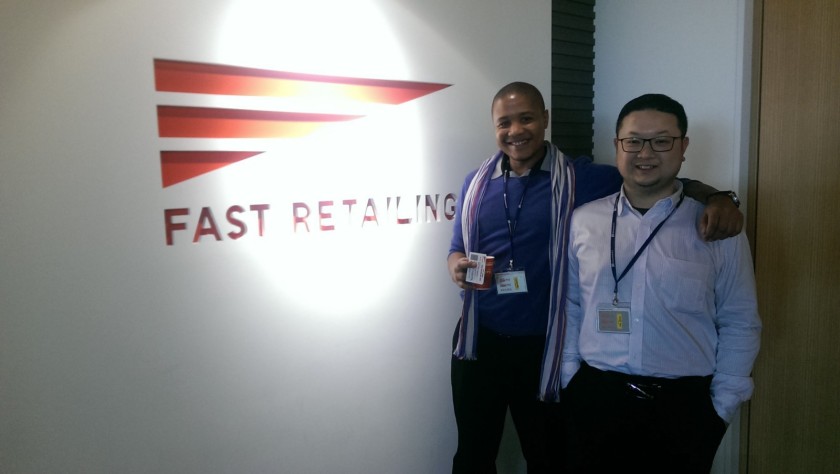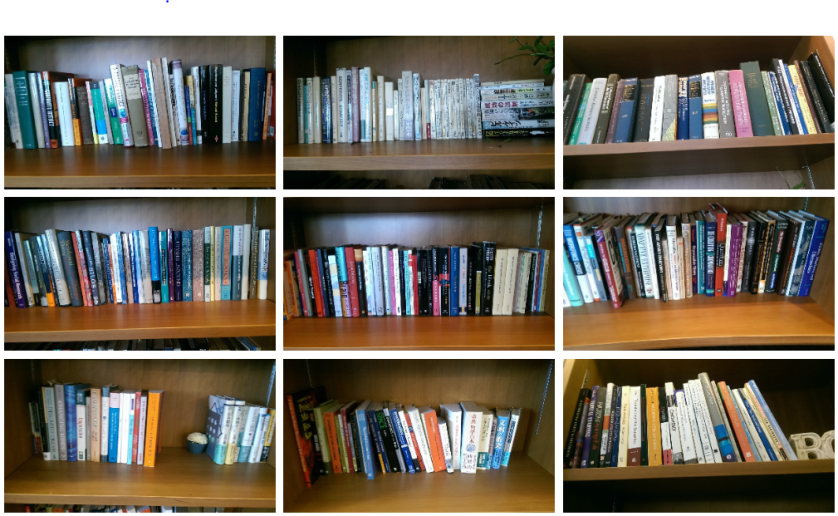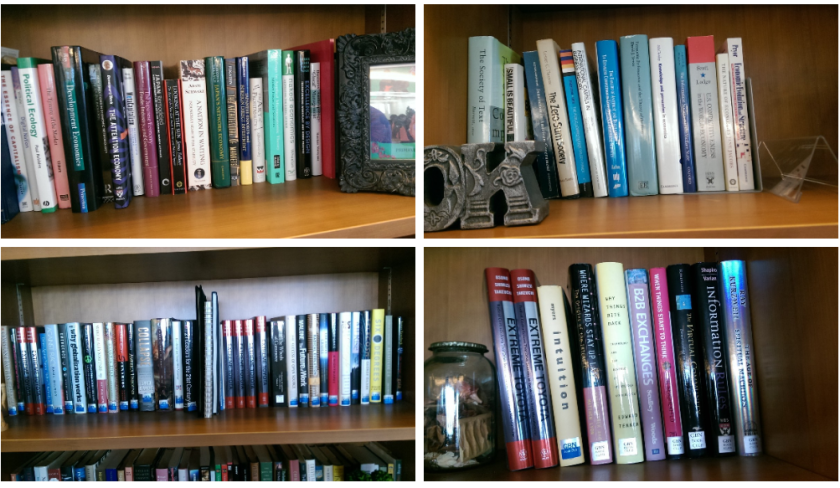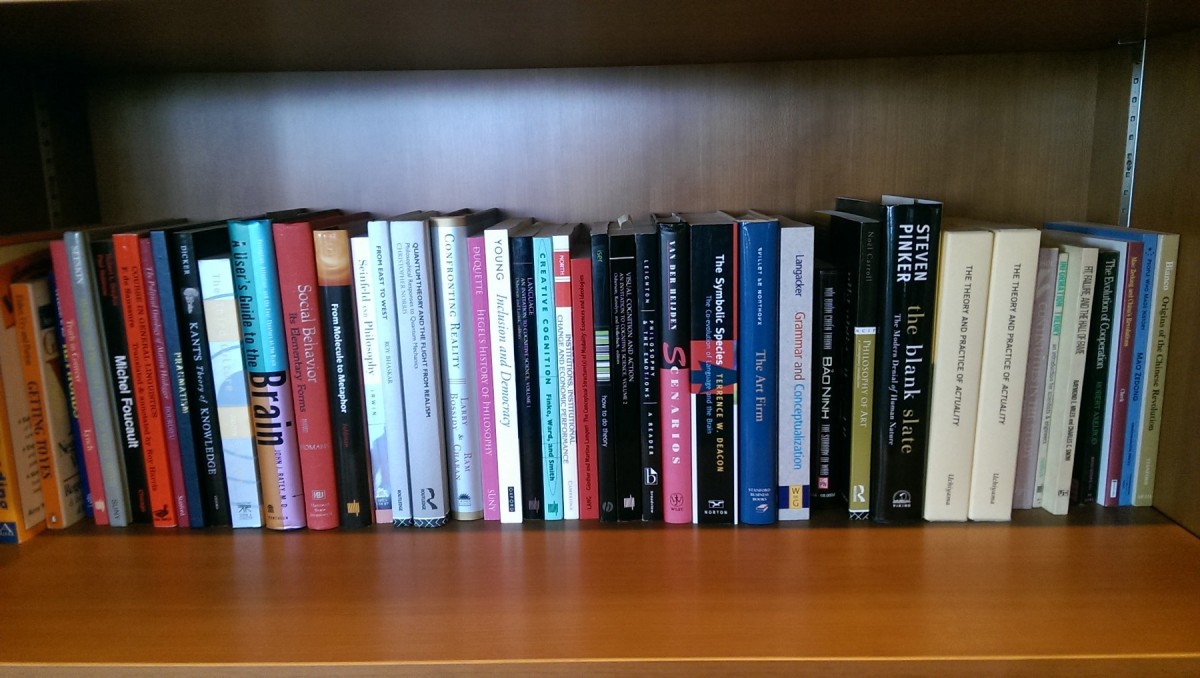“You think your pain and your heartbreak are unprecedented in the history of the world, but then you read. It was books that taught me that the things that tormented me most were the very things that connected me with all the people who were alive, who had ever been alive.” – James Baldwin
Back in 2016 I was fortunate enough to spend about a week in Tokyo attending a Hitotsubashi Graduate School of International Corporate Strategy exchange program. As part of that experience, we were hosted at Uniqlo’s 10-storey signature store in Ginza, and even more interestingly — spent time at Fast Retailing’s headquarters in Roppongi, chatting for about an hour with Tadashi Yenai — Japan’s richest man.

Outside of the lessons he was gracious enough to endow us with, a distinct impression I left with was how widely read he is — and how he tries to inculcate this culture of autodidacticism within his organisation. We spent our lunchtime munching on Bento boxes in one of their common areas where they keep many of their books. Given how secretive this company is in nature (they’ve still not allowed the snaps taken during the trip to their offices to be released except those taken outside their Uniqlo store in Ginza) — I thought I’d try to snap some picture of a few shelves to get a sense of what passes for interesting/useful in the halls of Fast Retailing.
To be sure this is a fantastically successful company whose ambition is to drive Uniqlo to become the world’s number apparel brand by 2020. They’re in a fierce tussle mainly with H&M & Zara and use similar strategies of very fast turnaround on designs/styles, low cost and a limited (but fast changing) range which is current.
The time spent at Uniqlo before they opened for the day was fascinating in seeing how much staff at all levels are expected to know about the company’s operations and strategy as well the intricacies of their particular store and floor. The kinds of questions we heard being asked were clearly those of a company that expects all to think and behave like a mini-general manager or mini-executive. Evidently this rolls up to holding company Fast Retailing itself and brings us back to those bookshelves. As stated, while getting fed I took a few pics (below) of about 250–300 titles of the titles on display and have collated these for your convenience dear reader.

“In my whole life, I have known no wise people (over a broad subject matter area) who didn’t read all the time — none, zero. You’d be amazed at how much Warren reads — and at how much I read. My children laugh at me. They think I’m a book with a couple of legs sticking out.” ― Charlie T. Munger
“I insist on a lot of time being spent, almost every day, to just sit and think. That is very uncommon in American business. I read and think. So I do more reading and thinking, and make less impulse decisions than most people in business. I do it because I like this kind of life.” ― Warren Buffett
Now the first thing which struck me when going through these tomes is the sheer breadth of the subjects at hand. Not just books on management and supply chain but the deep fascination with psychology, philosophy, history and sociology is hard to miss. Steve Jobs once said “Technology alone is not enough. It’s technology married with the liberal arts, married with the humanities, that yields us the results that make our hearts sing.”
Well this ethos is in full swing at Fast Retailing but of course all from economics to organisational theory were well represented.

Equally fascinating were where some of the largest clustering was occurring in terms of genre:
- A clear focus on philosophy
- Understanding and managing the human animal
- Efficiency & organisation
- Technology & Science
- History
Tadashi mentioned very specifically how important people are to him, his organisation and his history. No doubt he’s an extraordinary human being whose work ethic is decidedly Japanese but even he realised he couldn’t do it alone. Understanding his employees, business partners and enablers as well the potential clients and societies/cultures at large.
Also of interest are the fact that much of the material here is old…some of it VERY old. No doubt part of this is down to the fact that books are being donated to this pool and as such are slightly older, yet real wisdom is essentially ageless. In fact there are many successful people — Tim Ferris is an example — who essentially eschew keeping up with modern books, articles and newspapers in favour of older tomes which have stood the test of time. This “test of time” concept is explored by the inimitable Nassim taleb (of Black Swan & Anti-Fragile fame) through a concept he refers to as the Lindy Effect — the idea that the future life expectancy of some non-perishable thing like a technology or a book is proportional to it’s current age, so that every additional period of survival implies a longer remaining life expectancy.
Alas below is a list I’ve compiled with the books I could decipher from the images taken— enjoy and make your library great again.


I’ve categorised these into loose genres and attributed scores where I could source these from public sources like Goodreads or Amazon. You’ll note I’ve not transcribed any of the Japanese books…feel free to reach out and let me know what these are if you read Kanji 🙂
Key — [Book Title] \\ [Author] \\ [Score]
Anthropology
- The Symbolic Species: The Co-Evolution of Language and the Brain \\ Terence W. Deacon \\ 4.2
- Collapse: How Societies Choose to Fail or Succeed \\ Jared Diamond \\ Anthropology \\ 3.9
Biography
- Chomsky: Language, Mind and Politics \\ James McGilvray \\ 4.2
Business
- The Failure of Antitrust & Regulation to Establish Competion in Long Distance Telephone Service \\ Paul W. MacAvoy
- Supermarkets: 50 Years of Progress \\ Randolph McAusland
Decline of Service in Retail Trade \\ David Schwartzman - Catching Up With The Computer Revolution \\ HBR, Lynn M. Salerno (Editor)
- Knowledge and Competitive Advantage \\ Johann Peter Murmann \\ 4
- Economic Performance & The Theory of the Firm \\ David J Teece \\ 3.9
- Extreme Toyota: Radical Contradictions That Drive Success at the World’s Best Manufacturer \\ Emi Osono, Norihiko Shimizu, Hirotaka Takeuchi \\ 3.3
- B2B Exchanges \\ W. William A. Woods & Arthur B. Sculley \\ 3
Business History
- The Wheels of Commerce \\ Fernand Braudel \\ 4.4
- The Control Revolution \\ James R. Beniger \\ 4
Business Strategy
- Creating Value: Winners in the New Business Environment \\ Michael Hitt, Robert D. Nixon & Raphael Amit \\
- Scenarios: The Art of Strategic Conversation \\ Kees van der Heijden \\ 4.5
- MetaCapitalism: The E Business Revolution and the Design of 21st Century Companies and Markets \\ Grady E. Means & David Schneider \\ 3.8
- Spanning Silos \\ David Aaker \\ 3.7
- Confronting Reality \\ Larry Bossidy & Ram Charan \\ 3.7
- Attention Economy: Understanding the New Currency of Business \\ John C. Beck & Thomas H. Davenport \\ 3.6
Calculus
- Introductory Calculus for Business & Economics \\ Dennis G. Zill
Career Advice
- The Breakthrough Team Player \\ Andrew J Dubrin \\ 2
Change Management
- The Heart of Change \\ John P. Kotter \\ 4
Cognition
- Visual Cognition & Action: An Invitation To Cognitive Science \\ Daniel N. Osherson \\ 4.5
- Creative Cognition: Theory, Research, and Applications \\ Ronald A Finke, S. Smith & Thomas B. Ward \\ 5
- The Dynamics of Time & Space: Transcending Limits of Knowledge \\ Tarthang Tulku \\ 4.4
- A User’s Guide to the Brain \\ John J. Ratey. MD \\ 4
Communication
- On The Pragmatics of Communication \\ Jürgen Habermas \\ 3.8
Company Biography
- Making the CISCO Connection \\ David Bunnell \\ 3.1
Computer Science
- Parallel Distriuted Processing VI & VII \\ David E. Rumelhart, James L. McClelland & PDP Research Group \\ 5
Conference Notes
- International Cartels in Business History \\ Akira Kudō, Terushi Hara
Corporate Culture
- Corporate Instinct \\ Thomas M. Koulopoulos \\ 4
Corporate Culture & Organisational Effectiveness \\ Daniel R. Denison
Decision Theory
- Think \\ Michel Legault \\ 3.1
Design
- A Pattern Language: Towns, Buildings, Construction \\ Christopher W. Alexander, Sara Ishikawa, Murray Silverstein, Max Jacobson, Ingrid Fiksdahl-King, Shlomo Angel \\ 4.4
Ecology
- Political Ecology \\ Payl Robbins \\ 3.8
Economics
- US Competitiveness in the World Economy \\ Bruce Scott & George C. Lodge
- The Tyranny of The Market: A Critique of Theoretical Foundations \\ Douglas Vickers
- The Japanese Economy: Trade, Industry & Government \\ Ryūtarō Komiya
- The Essence of Capitalism \\ Humphrey McQueen \\ Economics
Readings in Applied Microeconomic Theory: Market Forces and Solutions \\ Robert E. Kuenne - Japan’s Network Economy: Structure, Persistence, and Change (Structural Analysis in the Social Sciences) \\ James Lincoln & Michael L Gerlach
- Japanese Exports & Foreign Direct Investment \\ Hideki Yamawaki
- Firms, Markets and Hierarchies: The Transaction Cost Economics Perspective \\ Glenn R. Carroll
- Economic Evolution & Structure \\ Frederic Pryor
- Small is Beautiful \\ E. F. Schumacher \\ 4.1
- Institutions, Institutional Change & Economic Performance \\ Douglass North \\ 4.1
- The Architecture of Markets \\ Neil Fligstein \\ 4
Naked Economics: Undressing the Dismal Science \\ Charles Wheelan \\ 4 - Looking At The Sun \\ James Fallows \\ 4
- Knowledge & Persuasion in Economics \\ Deirdre McCloskey \\ 4
- Information Rules \\ Carl Shapiro and Hal Varian \\ 4
- The Art of Profitability \\ Adrian Slywotzky \\ 3.9
- A Nation In Waiting: Indonesia’s Search for Stability \\ Adam Schwarz \\ 3.9
- The Nature of Economies \\ Jane Jacobs \\ 3.8
- Japan Remodeled \\ Steven K. Vogel \\ 3.6
- Why Globalisation Works \\ Martin Wolf \\ 3.5
- The Zero-Sum Society \\ Lester C Thurow \\ 3.5
- New Directions in Economic Methodology \\ Roger Backhouse \\ 3
Education
- The Dialectic of Freedom \\ Maxine Greene \\ 4.2
Energy
- Energy Future \\ Robert Stobaugh & Daniel Yergin (Editors)
Environmental
- The Ages of Gaia \\ James Loverlock \\ 3.8
Essays
- Untruth: Why the Conventional Wisdom Is (Almost Always) Wrong \\ Robert J Samuelson \\ 3.1
Fiction
- The Short Stories \\ Ernest Hemingway \\ 4.2
- The Sorrow of War \\ Bảo Ninh \\ 4
Finance
- Return on Investment (ROI) \\ Robert A. Peters
- Corporate Financial reporting \\ Andrew Higson
- When Genius Failed: The Rise & Fall of Long Term Capital Management \\ Roger Lowenstein \\ 4.2
- Essentials of Managerial Finance \\ Eugene F. Brigham & Scott Besley \\ 3.8
- Financial Management & Policy \\ James C. Van Horne \\ 3.6
Globalisation
- A Future Perfect \\ John Micklethwait & Adrian Wooldridge \\ 3.4
History
- Mao Zedong & China’s Revolution \\ Timothy Cheek
- Mao Zedong As Poet & Revolutionary Leader \\ C. Vaughan \\ 5
- The World War Two Reader (Routledge Readers in History) \\ Gordon Martel \\ 4.3
- The Shield of Achilles \\ Philip Bobbitt \\ 4.1
- Genghis Khan \\ Jack Weatherford \\ 4
- Origins of the Chinese Revolution, 1915–1949 \\ Lucien Bianco \\ 3.7
- Constant Battles: Why We Fight \\ Steven A. LeBlanc, Katherine E. Register \\ History \\ 3.7
- A Concise History of Finland \\ D. G. Kirby & David Kirby \\ 3.6
- People Who Made History: Mao Zedong \\ C.J. Shane \\ 3
- The Chinese Revolution & Mao Zedong in World History \\ Ann Malaspina \\ 2.5
Human Capital
- Virtual Learning: A Revolutionary Approach to Building a Highly Skilled
- Workforce \\ Roger C. Schank \\ 4.5
- Workforce Crisis: How to Beat the Coming Shortage of Skills And Talent \\ Ken Dychtwald & Tamara J Erickson \\ 4.2
- Hiring Smart: How to Predict Winners & Losers In The People-Reading Game \\ Pierre Mornell \\ 3.9
- Work-Based Learning: Bridging Knowledge and Action in the Workplace \\ Joseph A. Raelin \\ 3
Information Theory
- Information Theory: An introduction for scientists & engineers \\ Gordon Raisbeck \\ 4
- Information, Systems and Information System: Making Sense of the Field \\ Peter Checkland & Sue Holwell \\ 3.6
Innovation
- The Art of Innovation: Lessons in Creativity from Ideo, America’s Leading Design Firm \\ Tom Kelley, Jonathan Littman, Tom Peters \\ 4
Intellectual Capital
- Profiting from Intellectual Capital: Extracting Value from Innovation \\ Patrick H. Sullivan \\ 4
Japanese History
- Japanese Culture \\ H. Paul Varley \\ 3.8
- Tokugawa Religion \\ Robert Neelly Bellah \\ 3.7
Leadership
- 21st Century Leaders for the 21st Century \\ Fons Trompenaars & Charles Hampden-Turner \\ 3.8
Linguistics
- Abduction, Belief and Context in Dialogue: Studies in Computational Pragmatics \\ Harry Bunt & William Black
- Grammar & Conceptualisation \\ Ronald Langacker \\ 4.8
- Toward a Cognitive Semantics \\ Leonard Talmy \\ 3.9
- From Molecule to Metaphor: A Neural Theory of Language \\ Jerome A. Feldman \\ 3.7
- Narratology: Introduction to the Theory of Narrative \\ Mieke Bal \\ 3.6
- Mappings in Thought & Language \\ Gilles Fauconnier \\ 4.2
Literary Theory
- Literary Theory: A Very Short Introduction \\ Jonathan Culler \\ 3.7
Management Theory
- The Great Organisers \\ Ernest Dale
- The Executive Role Constellation: An Analysis of Personality and Role Relations in Management Hardcover \\ Daniel J. Levinson, Abraham Zaleznik & Richard C Hodgson
- Management: Inventing and Delivering Its Future \\ Richard L. Schmalensee & Thomas Anton Kochan
- The Art Firm: Aesthetic Management and Metaphysical Marketing \\ Pierre Guillet De Monthoux \\ 5
- Business Anthropology: ‘Glocal’ Management \\ Motofusa Murayama \\
- Basho Management \\ Masao Maekawa \\ 4
- Team Players & Teamwork \\ Glenn Parker \\ 3.8
- American Anti-Management Theories of Organization: A Critique of Paradigm Proliferation \\ Lex Donaldson \\ 3
Euromanagement: A New Style for the Global Market \\ Helen Bloom \\ 2 - Productivity Analysis as a Resource Management Tool in the Retail Trade \\ Hirotaka Takeuchi
Marketing
- Marketing Performance Assessment \\ Thomas V. Bonoma & Bruce H. Clark
- Marketing Models & Econometric Research \\ Leonard J. Parsons & Randall L. Schultz \\ 4
- The Design Dimension: The New Competitive Weapon for Product Strategy and Global Marketing \\ Christopher Lorenz \\ 3.5
Mathematics
- Mathematics: A Foundation for Decisions \\ Dennis E. Grawoig
- Elemetary Calculus for Business, Economics & Social Sciencies \\ Chaney Anderson and R. C. Pierce
- Descartes’ Dream \\ Philip J. Davis \\ 3.8
Memoir
- A Life In Our Times \\ John Kenneth Galbraith \\ 4
Military History
- Friendly Fire: The Accidental Shootdown of U.S. Black Hawks Over Northern Iraq \\ Scott A. Snook \\ 4.2
- Military Innovation In the Interwar Period \\ Allan Reed Millett & Williamson Murray \\ 3.8
- The Dynamics of Military Revolution \\ MacGregor Knox & Williamson Murray \\ 3.5
Modern History
- The Future & It’s Enemies \\ Virginia Postrel \\ 4.1
- Crimes Against Nature \\ Robert F. Kennedy, Jr. \\ 4.1
- The Information Society & The Welfare State: The Finnish Model \\ Manuel Castells & Pekka Himanen \\ 3.9
- America Unbound \\ Ivo Daalder & James M. Lindsay \\ 3.4
- Innovation in American Government \\ Alan A. Altshuler & Robert D. Behn \\ 3
Motivation & Reward
- Intrinsic Motivation At Work \\ Edward L. Deci & Richard M. Ryan \\ 3.8
Negotiation
- Getting to Yes \\ Bruce Patton, Roger Fisher & William Ury \\ 3.7
Organisational Theory
- Readings on Modern Organisations \\ Amitai Etzioni
- Organisations: Structure & Process \\ Hall, R.H.
- Organisation Theory and the Multinational Corporation \\ Sumantra Ghoshal & D. Eleanor Westney
- The Demography of Corporations & Industries \\ Glenn R. Carroll & Michael T. Hannan \\ 4.5
- Recreating The Corporation \\ Russell L. Ackoff \\ 4.5
- Excellence By Design: Transforming Workplace and Work Practice \\ Turid Horgen, Michael L. Joroff, William L. Porter & Donald A. Schon \\ 4.5
- The Twenty-First-Century Firm: Changing Economic Organization in International Perspective \\ Paul DiMaggio \\ 4.3
- The Dynamics of Rules: Change in Written Organizational Codes \\ James G. March, Martin Schulz & Xueguang Zhou \\ 4
- Adaptive Enterprise: Creating and Leading Sense-And-Respond Organizations \\ Stephan H. Haeckel \\ 4
- Imaginization: New Mindsets For Seeing, Organizing And Managing \\ Gareth Morgan \\ 3.7
- Quantum Organisations \\ Ralph H. Kilmann \\ 3.5
Philosophy
- The Theory & Practice of Actuality \\ Uchiyama
- Redirecting Philosophy: Reflections on the Nature of Knowledge from Plato to Lonerga \\ Hugo Anthony Meynell
- Philosophy of Science Journal \\
- Philosophy & The Emotions: A Reader \\ Stephen Leighton
- Kant’s Theory of Knowledge \\ Georges Dicker
- Hegel’s History of Philosophy: New Interpretations \\ David A. Duquette
- Explaining Beliefs \\ Anthonie W. M. Meijers
- Dialetics of The Will: Freedom, Power, and Understanding in Modern
- French and German Thought \\ John H. Smith
- Belief and its Neutralisation \\ Marcus Brainard
- Being & Worth \\ Andrew Collier
- Hegel & Aesthetics \\ William Maker \\ 5
- From East to West \\ Roy Bhaskar \\ 5
- A Search for Unity in Diversity: The ‘Permanent Hegelian Deposit’ in the Philosophy of John Dewey \\ James A. Good \\ 5
- Reconceptions in Philosphy and Other Arts and Sciences \\ Catherine Elgin & Nelson Goodman \\ 4.5
- Michel Foucault: Beyond Structuralism and Hermeneutics \\ Hubert Dreyfus and Paul Rabinow \\ 4.5
- Philosophy As A Way of Life \\ Pierre Hadot \\ 4.3
- The Production of Space \\ Henri Lefebvre \\ 4.2
- Experience & Judgement \\ Edmund Husseri \\ 4.2
- Popper Selections \\ Karl Popper \\ 4.1
- Wittgenstein (One World Philosophers) \\ Avrum Stroll \\ 4
- The Thinking of The Sensible \\ Mauro Carbone \\ 4
- The Power of Dialogue \\ Hans-Herbert Kögler \\ 4
- Pragmatism: A Reader \\ Louis Menand \\ 4
- Pragmatism: A new name for some old ways of thinking \\ William James \\ 4
- Dialectic and Dialogue: Plato’s Practice of Philosophical Inquiry \\ Francisco J. Gonzalez \\ 4
- Ulysses Unbound \\ Jon Elster \\ 3.9
- The Transcendence of the Ego \\ Essay by Jean-Paul Sartre \\ 3.9
- Structuralism & Poststructuralism for Beginners \\ Donald Palmer \\ 3.9
- Serendipities \\ Umberto Eco \\ 3.8
- Points of View \\ A. W. Moore \\ 3.8
- Critique of Dialectical Reason \\ Jean-Paul Satre\\ 3.8
- Ten Problems of Consciousness: A Representational Theory of the Phenomenal Mind \\ Michael Tye \\ 3.6
- Philosophy of Art: A Contemporary Introduction \\ Noel Carroll \\ 3.6
- An Intelligent Person’s Guide to Philosophy \\ Roger Scruton \\ 3.6
- Toward A Logic of Meaning \\ Philip Davidson \\ 3.5
- The Geometry of Meaning \\ Peter Gärdenfors \\ 3.5
- Seinfeld and Philosophy \\ William Irwin \\ 3.5
- Epistemology: A Contemporary Introduction to the theory of knowledge \\ Robert Audi \\ 3.5
- Knowledge and Mind: A Philosophical Introduction \\ Andrew Brook & Robert J. Stainton \\ 3.4
- Hegel’s Epistemology \\ Kenneth R. Westphal \\ 2.8
- Phenomenology & Deconstruction \\ Robert Denoon Cumming \\ 2.5
- The Other Husserl: Horizons of Transcendental Phenomonology \\ Donn Welton \\ 3.8
Political Theory
- Marx for Beginners \\ Rius \\ 3.8
- Agendas, Alternatives & Public Policies \\ John W. Kingdon \\ 3.6
- Inclusion & Democracy \\ Iris Marion Young \\ 3.5
- The Political Ontology of Martin Heidegger \\ Pierre Bourdieu \\ 3.3
Politics
- A Theory of Public Bureaucracy \\ Donald P Warwick, Marvin Meade & Theodore Libby Reed \\ 5
- A Call to Action: Women, Religion, Violence, and Power \\ Jimmy Carter \\ 4
Politics & Philosophy
- Freedom and its Betrayal: Six Enemies of Human Liberty \\ Isiah Berlin \\ 4.3
Productivity
- Getting Results from Electronic Meetings \\ Alan Weatherall \\ 5
Project Management
- The Guide to the Project Management Body of Knowledge \\ Project Management Institute \\ Project Management \\ 3.6
Psychology
- The Evolution of Human Nature \\ Charles Judson Herrick
- The Act of Thinking \\ Derek Melser \\ 4.5
- Minding Minds \\ Radu J. Bogdan \\ 4.5
- Practical Intelligence in Everyday Life \\ Robert Sternberg \\ 4.4
- Who Really Matters: The Core Group Theory of Power \\ Art Kleiner \\ 4.2
- Presence \\ Amy Cuddy \\ 4
- Frames of Mind: The Theory of Multiple Intelligences \\ Howard Gardner \\ 4
- Intelligence Reframed \\ Howard Gardner \\ 3.7
- Intuition \\ David Myers \\ 3.6
- Changing Minds: The Art And Science of Changing Our Own And Other
- People’s Minds \\ Howard Gardner \\ 3.6
Research Design
- Designing Social Research \\ Norman Blaikie \\ 4.8
Science
- The Evolution of Cooperation \\ Robert Axelrod \\ 4.2
- Quantum Theory & The Flight from Realism: Philosophical Responses to
- Quantum Mechanics \\ Christopher Norris \\ 4
- The Third Culture \\ John Brockman \\ 3.8
- Radical Evolution \\ Joel Garreau \\ 3.8
- Introducing Chaos \\ Ziauddin Sardar \\ 3.5
- Time, Space & Things \\ B. K. Ridley \\ 3.9
Service
- Living Service: How to Deliver the Service of the Future Today \\ Marc Silvester & Mohi Ahmed
Sociology
- The Virtual Community: Homesteading on the Electronic Frontier \\ Howard Rheingold \\ 3.8
- Plenitude 2,0 \\ Grant McCracken
- Continuities in the Study of Social Conflict \\ Lewis A. Coser
- All Rise: Somebodies, Nobodies, and the Politics of Dignity \\ Robert W. Fuller \\ 4.3
- 48 Laws of Power \\ Robert Greene \\ 4.2
- The Blank Slate: The Modern Denial of Human Nature \\ Steven Pinker \\ 4.1
- Organizing America: Wealth, Power, and the Origins of Corporate Capitalism \\ Charles Perrow \\ 4.1
- On Civilisation, Power & Knowledge \\ Norbet Elias \\ 4.1
- Against Race: Imagining Political Culture Beyond the Colour Line \\ Paul Gilroy \\ 3.6
- The Myth of Social Action \\ Colin Campbell \\ 3.5
- Digital Nation \\ Anthony G. Wilhelm \\ 3.1
- Social Behaviour: It’s Elemetary Forms \\ George C. Homans \\ 3
- Max Weber’s Methodology: The Unification of the Cultural and Social Sciences \\ Fritz K. Ringer \\ 2.8
- The Closing of the American Mind \\ Allan Bloom \\ 3.7
Statistics
- Statistics: An Introductory Analysis \\ Taro Yamane
- Statistical Analysus for Business Decisions \\ Charles Pius Bonini & William Alfred Spurr
- Complete Business Statistics \\ Amir Aczel \\ 3.6
Surveys
- Mail and Telephone Surveys: The Total Design Method \\ Don A. Dillman
Systems Theory
- The Conceptual Structures(s) of Modality: Essences & Ideologies \\ Gunther & Martina Lampert
- Systems Thinking: Creative Holism for Managers \\ Michael Jackson \\ 3.9
Technology
- Information Management: The Strategic Dimension \\ Michael Earl \\
- The Age of Spiritual Machines \\ Ray Kurzweil \\ 4
- Emergence: The Connected Lives of Ants, Brains, Cities, and Software \\ Steven Johnson \\ 4
- The Success of Open Source \\ Steven Weber \\ 3.9
- The Future of Work \\ Thomas W. Malone \\ 3.9
- When Things Start To Think \\ Neil Gershenfeld \\ 3.7
- Telecosm \\ George Gilder \\ 3.6
- Why Things Bite Back \\ Edrward Tenner \\ 3.5
- The Society of Text \\ Edward Barrett \\ 3.5
Technology History
- Where Wizards Stay Up Late; The Origins of the Internet \\ Katie Hafner & Matthew Lyon \\ 3.9
- What The Dormouse Said: How 60s Counterculture Shaped the PC Industry \\ John Markoff \\ 3.8
- In The Beginning..Was The Command Line \\ Neal Stephenson \\ 3.8
Writing
- Elements of Style \\ E. B. White & William Strunk Jr. \\ 4.2

Siya Gule (@siyagule on Twitter)
Tech. Literature. Culture. Business. Thinking about Thinking
“Today a reader, tomorrow a leader.” ― Margaret Fuller
